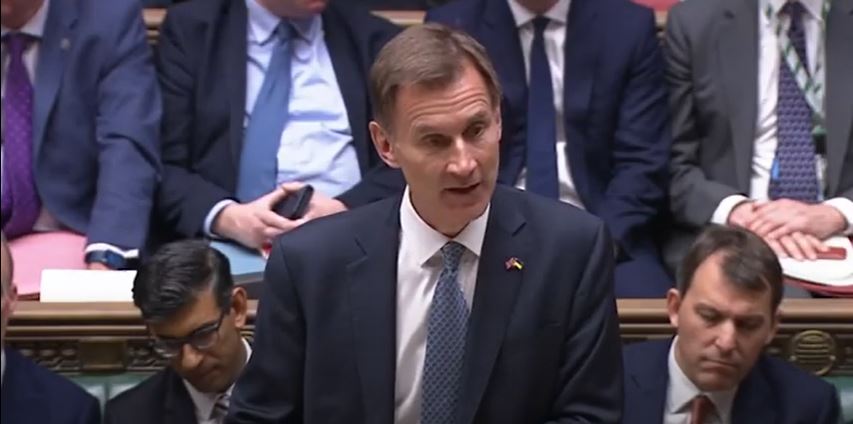British finance minister Jeremy Hunt unveiled his budget program in the anticipated fiscal statement. Hunt warned that the country’s economy is already in recession as tax hikes and budget cuts are ahead.
Hunt unveiled the plan Thursday in his remarks at the House of Commons in order to patch up the country’s finances. Hunt said that the plan prioritized “stability, growth, and public services.” Hunt said that over half the country’s needed fiscal consolidation of £55 billion would come from spending cuts.
“On tax, I have tried to be fair by following two broad principles: Firstly, we ask those with more to contribute more; and secondly, we avoid the tax rises that most damage growth,” said Hunt.
Hunt lowered the threshold where the 45 percent personal income tax rate becomes payable from £150,000 to £125,140. Those who would earn £150,000 or more would have to pay a little more than £1,200 more per year. Hunt also said the government would increase a windfall tax on oil and gas companies and extend it to power generation firms.
The rate would go up to 35 percent from the current rate of 25 percent. This would also apply to electricity generators with a rate of 45 percent starting January 1, 2023.
Hunt said the country’s healthcare and social system would receive an £8 billion package in a span of two years, citing that healthcare chiefs said the amount would help address key priorities. Hunt also said he would increase the National Health Service’s budget in the coming two years by an additional £3.3 billion.
The social care sector would have a £2.8 billion increase in funding for 2023 and £4.7 billion the following year.
When it came to public spending, Hunt said that it would grow more slowly than the economy, and for the remaining two years of the government’s Spending Review, it would protect the increases in departmental budgets that were already set out in cash terms, a sharp cut due to high inflation rates.
“And we will then grow resource spending at 1 percent a year in real terms, in the three years that follow,” said Hunt. “Although departments will have to make efficiencies to deal with inflationary pressures in the next two years, this decision means overall spending in public services will continue to rise, in real terms, for the next five years.”



 Trump Allegedly Sought Airport, Penn Station Renaming in Exchange for Hudson River Tunnel Funding
Trump Allegedly Sought Airport, Penn Station Renaming in Exchange for Hudson River Tunnel Funding  US Pushes Ukraine-Russia Peace Talks Before Summer Amid Escalating Attacks
US Pushes Ukraine-Russia Peace Talks Before Summer Amid Escalating Attacks  TrumpRx.gov Highlights GLP-1 Drug Discounts but Offers Limited Savings for Most Americans
TrumpRx.gov Highlights GLP-1 Drug Discounts but Offers Limited Savings for Most Americans  U.S. Lawmakers to Review Unredacted Jeffrey Epstein DOJ Files Starting Monday
U.S. Lawmakers to Review Unredacted Jeffrey Epstein DOJ Files Starting Monday  Trump Lifts 25% Tariff on Indian Goods in Strategic U.S.–India Trade and Energy Deal
Trump Lifts 25% Tariff on Indian Goods in Strategic U.S.–India Trade and Energy Deal  U.S. to Begin Paying UN Dues as Financial Crisis Spurs Push for Reforms
U.S. to Begin Paying UN Dues as Financial Crisis Spurs Push for Reforms  South Korea Assures U.S. on Trade Deal Commitments Amid Tariff Concerns
South Korea Assures U.S. on Trade Deal Commitments Amid Tariff Concerns  TrumpRx Website Launches to Offer Discounted Prescription Drugs for Cash-Paying Americans
TrumpRx Website Launches to Offer Discounted Prescription Drugs for Cash-Paying Americans  Trump Signs “America First Arms Transfer Strategy” to Prioritize U.S. Weapons Sales
Trump Signs “America First Arms Transfer Strategy” to Prioritize U.S. Weapons Sales  U.S.-India Trade Framework Signals Major Shift in Tariffs, Energy, and Supply Chains
U.S.-India Trade Framework Signals Major Shift in Tariffs, Energy, and Supply Chains  Iran–U.S. Nuclear Talks in Oman Face Major Hurdles Amid Rising Regional Tensions
Iran–U.S. Nuclear Talks in Oman Face Major Hurdles Amid Rising Regional Tensions  Trump Allows Commercial Fishing in Protected New England Waters
Trump Allows Commercial Fishing in Protected New England Waters  China Warns US Arms Sales to Taiwan Could Disrupt Trump’s Planned Visit
China Warns US Arms Sales to Taiwan Could Disrupt Trump’s Planned Visit  Trump Backs Nexstar–Tegna Merger Amid Shifting U.S. Media Landscape
Trump Backs Nexstar–Tegna Merger Amid Shifting U.S. Media Landscape  Netanyahu to Meet Trump in Washington as Iran Nuclear Talks Intensify
Netanyahu to Meet Trump in Washington as Iran Nuclear Talks Intensify  Norway Opens Corruption Probe Into Former PM and Nobel Committee Chair Thorbjoern Jagland Over Epstein Links
Norway Opens Corruption Probe Into Former PM and Nobel Committee Chair Thorbjoern Jagland Over Epstein Links 































